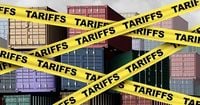In light of ongoing tariff challenges, South Africa is poised to strengthen its trade relations with the United States while simultaneously deepening its commercial ties with China. These two nations stand as South Africa's leading trade partners, and the importance of maintaining robust relationships with both cannot be overstated.
China has recently made it clear that it will oppose any country negotiating trade deals with the U.S. at its expense. However, South Africa is not looking to resolve its challenges with the U.S. at the detriment of its relationships with other countries. This sentiment underscores the need for South Africa to cultivate friendships with as many nations as possible. Drawing inspiration from India, which has managed to maintain cordial relations with a diverse array of countries, South Africa must prioritize its national interests without becoming overly distracted by external pressures.
One sector where this approach is particularly crucial is agriculture. South Africa's agricultural sector is heavily export-oriented, achieving a record $13.7 billion in exports in 2024, which marks a 3% increase year-over-year. The export markets are varied, with nearly half of these exports going to the African continent, while significant portions also reach the European Union (EU), the Middle East, Asia, and the United Kingdom.
Maintaining warm relations with these regions is vital for the sustainability of South Africa's agricultural sector. However, the EU-South Africa agricultural trade has faced some friction, especially concerning citrus exports. Boitshoko Ntshabele, CEO of the Citrus Growers' Association (CGA), noted that the South African citrus industry has built a remarkable relationship with the U.S. market over decades. This established connection is crucial as South Africa navigates potential challenges in maintaining access to the U.S. market.
Despite the existing challenges, it is essential that South Africa continues to strengthen its relations with the EU. There is a growing sentiment among EU farmers that the region must manage its imports to protect domestic producers. While it is unlikely that EU policymakers will impose tariffs or stricter policies that discourage imports, South Africa must proactively reaffirm the importance of its agricultural exports to the EU. This ongoing engagement is crucial for maintaining access to these vital markets.
Moreover, the Middle East presents significant potential for expansion, as there are no domestic competing farmer interests in this region. Although a considerable share of South Africa's agricultural products are already exported to the Middle East, the presence of South African agriculture in this area remains relatively peripheral. A more robust strategy to promote trade deals with Middle Eastern countries, particularly Saudi Arabia, the United Arab Emirates (UAE), and Qatar, is essential for enhancing South Africa's agricultural footprint in this region.
As South Africa looks to maintain its access to agricultural products and other goods in the U.S. market, it must seek better trade terms following the current 90-day pause. This effort will require collaboration between the government and businesses to continually open up export markets. The African continent also remains a key anchor for South Africa's agricultural exports, necessitating ongoing engagement to strengthen relations. Such efforts are vital to avoid the friction that has previously arisen, such as the vegetable export ban with Botswana, which has now been resolved, and the ongoing restrictions with Namibia, as well as issues with the banana trade in Tanzania.
In essence, South Africa must adopt a long-term vision that recognizes the importance of strengthening relationships with various countries to ensure the growth of its agricultural sector. The government, in collaboration with businesses, should lead these efforts to continually open up new export markets and address existing challenges.
As South Africa navigates the complexities of international trade, the agricultural sector stands at the forefront of these efforts. With its diverse export markets and the potential for growth in new regions, the country is well-positioned to enhance its global trade relationships. It is crucial that South Africa remains proactive in fostering strong ties with both established partners like the U.S. and emerging markets in the Middle East and beyond.
Ultimately, the success of South Africa's agricultural sector will depend on its ability to adapt and thrive in an ever-changing global landscape. By prioritizing its national interests and cultivating friendships with a wide range of countries, South Africa can ensure that its agricultural exports continue to flourish in the years to come.







